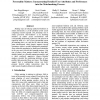Free Online Productivity Tools
i2Speak
i2Symbol
i2OCR
iTex2Img
iWeb2Print
iWeb2Shot
i2Type
iPdf2Split
iPdf2Merge
i2Bopomofo
i2Arabic
i2Style
i2Image
i2PDF
iLatex2Rtf
Sci2ools
HICSS
2007
IEEE
2007
IEEE
Personality Matters: Incorporating Detailed User Attributes and Preferences into the Matchmaking Process
Finding ways of reducing undesired behavior in online interactions is at the forefront of the social computing research agenda. One promising way to reduce perceived “bad behavior” is by matching members of online social environments with corresponding behavioral preferences. We present an empirical study (N = 267) of an experimental system for matching users. As a test bed we chose the online game MechAssault, which largely supports one-off encounters within a socially homogenous population. Even within this population we found great variability in the way users selected their gaming partners. One type of player chose partners mainly on their skill, another mainly on a friendly gaming personality, and a third preferred aggressive players. Detailed analyses revealed the underlying attributes of user profiles that generated these user types. The findings suggest that a matchmaking system can better promote desired online interactions than the enforcement of uniform behavioral stand...
Biometrics | HICSS 2007 | Online Interactions | Online Social Environments | Player Chose Partners | System Sciences |
| Added | 02 Jun 2010 |
| Updated | 02 Jun 2010 |
| Type | Conference |
| Year | 2007 |
| Where | HICSS |
| Authors | Jens Riegelsberger, Scott Counts, Shelly Farnham, Bruce C. Philips |
Comments (0)

